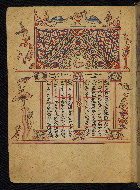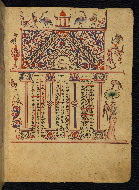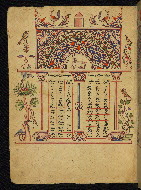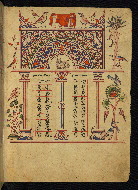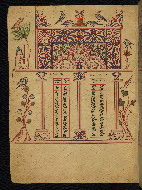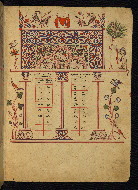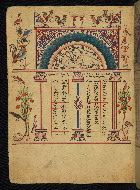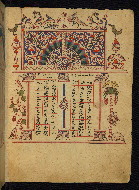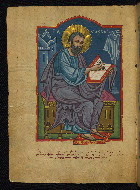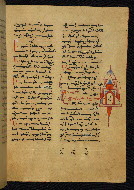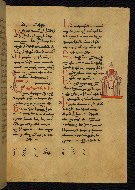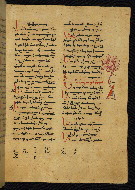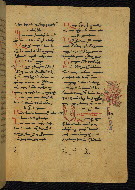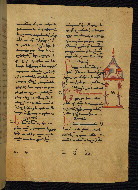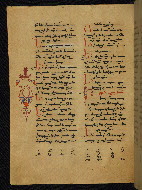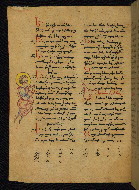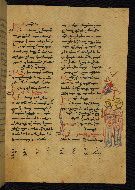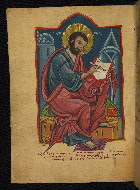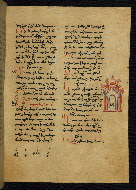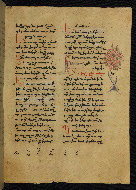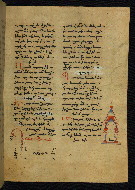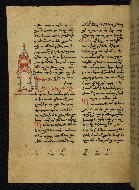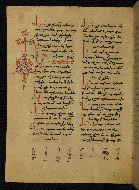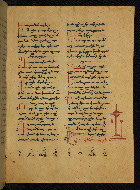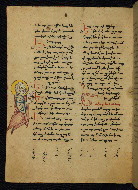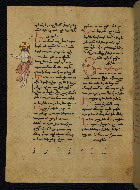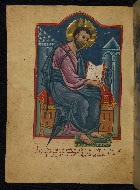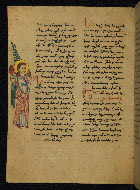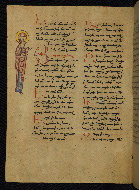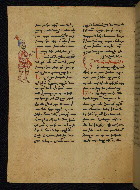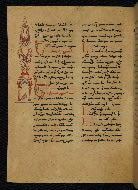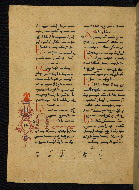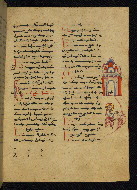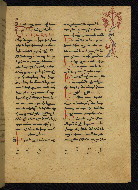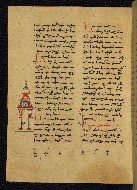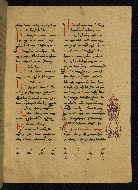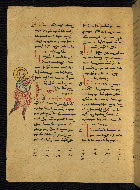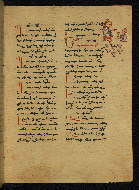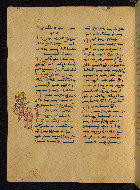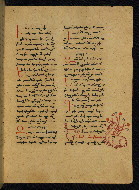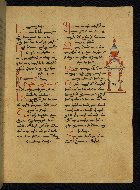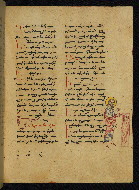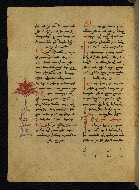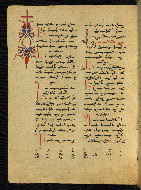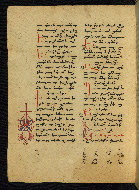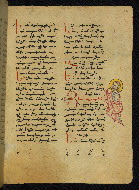Home > Digitized Walters Manuscripts
This document is a tranformation of a TEI P5 XML manuscript description incorporating images. If you have trouble reading special or non-Latin characters on this page, please make sure you have appropriate Unicode fonts installed and an up-to-date web browser.
Walters Ms. W.541, Amida Gospels
Browse images (Browse images in a new window) | TEI in XML format
W.541
Amida Gospels
Vernacular: Աւետարան
This Gospel Book, with richly painted Evangelist portraits, canon tables, and marginal illuminations, was made in Armenia in the early seventeenth century. An extensive colophon reveals that it was commissioned by a woman named Napat' as a memorial for herself and her family, and the book was consequently given by her to the Church of St. Sargis in Amida. The illuminator of the manuscript, Hovannes, was one of the most prolific among the artists and scribes at the Amida scriptorium. On the present codex he worked with the scribe Melk'on. Known collaborators, Hovannes and Melk'on executed a number of codices together.
Early 17th century CE
Amida, Armenia
Supplied name: Hovannes, son of Chanipek and Et'ar
Known as: Yovannes
Supplied name: Melk'on
Book
Scriptural
The primary language in this manuscript is Armenian.
- In vernacular: Fol. 10v Մաթէոս մարդ անուանեցաւ, զի զմարդկութիւն տեառն սկսաւ, յԱբրահամէ պատմել կարգաւ, և զոր արարն մինչև յարեաւ: Ծաղկօղ սորա որ յոյժ մեղաւ, հանդիպողացդ պաղատեցաւ, զի թողութիւն հայցել սովաւ, սուրբ աղօթիւք յաղթանակաւ: Fol. 70v Այս Մարկոսի ասի առիւծ, զի սիգաճեմ է չէ գծուծ, երագ որսայ ըմբռնէ բուծ, սոյնպէս արար զբանս իւր հըծուծ: Ծաղկողս որ եմ մեղօք ի բուծ, զձեզ աղաչեմ արտասուահոծ, զի թողութիւն հայցել իմոց, որ կամ ի լաց և մինչ ի կոծ: Fol. 112v Այս Ղուկասու եզն ասացին, որպէս նա իսկ հերկէ զգետին, կրկին անխոնճ վասն պտղին, սոյնպէս երկարեն բանք սորին: Եւ անարժան ծաղկող սորին, զձեզ աղաչէ ողորմագին, զի թողութիւն հայցէք նմին, ւասել սրտիւ զտէր ողորմին: Fol. 182v Այս Յոհաննէս արծոււանըման, թըռեաւ մըտաւքն անհասական, առ ի պատմել որդւոց մարդկան, զանճառ էիցըս հանրական: Եւ ես ծաղկողըս անարժան, որ Յովանէս կոչիմ յանուան, ըզիս արէք յիշման արժան, և զձեզ աւրհնէ անմահ արքայն: Fol.236v Փառք անըսկզբան և ի սկզբանն ամենայնի, անեղին և գոյացուցչին բնաւից, անվախճան և անսահման էացուցչին, սահմանիչ և կատարումն բոլոր էիցս, երիցս միակին, եզակի և միում աստուածութեան, որ անշարժ գոլով շարժէ զարարածս ’ի կեանս և ’ի փրկութիւն: Էիցս էակն, և կենդանեաց կեանքն, որ անփոփոխ գոլով միշտ յէութեան, անեզրն և անվայրափակըն, լրումն և բովանդակիչ ամենայնի, և յամենայնս է, և յամենայնէ անհաս է, որպէս ’ի մասունս և ’ի բոլորս, և ինքն ոչ մասն, և ոչ բոլոր որպէս թէ զմասն և զբոլորն, զամենայն ինքն ունելով, և կրէ զամենայն բանիւ զաւրութեան իւրոյ, գերալիր գոլով լնու զամենայն որում բան, և իմաստութիւն, և լեզու տուեալ բոլորիցս: Եւ ի բոլոր էիցս հանցուք զաւրհնութիւն և զփառս հաւր և որդւոյ և հոգւոյն սրբոյ, այժմ և միշտ և յաւիտեանս յաւիտենից, ամէն: Իսկ զչորից աւետարանչացս խորհուրդն բազմաւրինակ իմն ցուցմամբ տեսանի, որպէս ասեն թէ չորից աւետարանչացն` են աւրինակ չորք (Fol. 237) անկիւնք արարածոց, Արեւելք, Արեւմուտք, Հիւսիս, Հարաւ, որ պարտ էր ընդ քառանկիւնս տիեզերաց համասփիւռ քարոզել զաւետարանն: Իսկ ոմանց հաճոյ թուեցաւ ըստ չորից մշտահոս գետոց, յադենական աղբերէն յառաջ խաղացեալ առ ի տիեզերաց առոգումն, Փիսոն, որ նշանակէ զՄատթէոս, և Գեհոն զՄարկոս, Տիգրիս զՂուկաս, և Եփրատէս զՅոհաննէս: Եւ սոցին գոլով նմանապէս թուով ուռճացեալք, ’ի կենդանական աղբերէն առոգանել զպասքեալ միտս մարդկային բնութեանս: Սոյն աւրինակ ըստ տեսութեանն Եզեկիէլի քառակերպեան աթորոյ: Մարդ, որ նշանակէ զՄաթէոս, և Առե ւծ զՄարկոս, Եզն, զՂուկաս, և Արծիւ զՅոհաննէս: Զանմարմնոցն տէրն տեսանելով բազմեալ ի փառացն աթոռ իմանալի ցուցմամբ ըզխնամս բոլոր բնութեանս զակնարկումն, որ աստուածապէս և տիրաբար բերմամբ նշանակէ զլինելն առ հողածինս հրեղինացն անմահից, զմահկանացուս առնել հաղորդս: Եւ յեւս գերակատար հանել ի փառս, վասն (Fol.237v) զի փառաց թագաւորն Քրիստոս, էակիցն հաւր և փառակից հոգւոյն սրբոյ, զմերս առնելով բնութիւն յինքեան միացոյց աստուածութեան, ուսուցանելով մի որդի դաւանել որ յԱստուծոյ հաւրէ, և որ ի Մարիամայ սըրբոյ կուսէն անճառ միութեամբ, զոր աւետարանականն ուսուցանեն բանք, մինչ ’ի կատարած հաւանութեամբ հաւատալ հաստատ կարգաւք, ’ի նոյն յարելով յառաքելաւանդ քարոզութիւն զաստուածախաւսն վարդապետութիւն դրոշմեալ զսակաւս ’ի բազմացն առ ի հաւատալ, եթէ Յիսուս Քրիստոս է որդի Աստուծոյ ըստ վեհին Յովհաննու, հաւատալ և զկեանսն յաւիտենականս ընդունել յանուն նորա: Ուստի տեսեալ ըզսորա անճառ փրկագործութեան խորհուրդն, և զանճողոպրելի վեհագոյն մեծ փարթամութիւն և զանծախելի գանձիս անսպառութիւնն և զանանց բարութիւնսն որ հանէ ’ի կեանսն անվախճան: Զոր ցանկացաւղ եղեալ քրիստոսասէր և հաւատարիմ աւրհնեալ կինն Նապաթն, և ետ գրել զսուրբ քառաջահեան աւետարանս յիշատակ հոգւոյ իւրոյ և ծնաւղաց իւրոց, հօրն Սարգսին, և մաւրն Տըլշատին, և իւր հանգուցեալ որդոցն Մելքոնին և Խաչատուրին և Ղարիպին (one folio missing) Fol. 238, (հո)գւոյ իւրոյ և ծնաւղաց իւրոց, և ետ նուէր և ընծայ ի դուռն սուրբ Սարգսի եկեղեցւոյն, զի միշտ և հանապազ ընթերցցի ի ժամ սոսկալի սուրբ պատարագին առաջի անմահ զենմանն, ’ի յունկն կենդանեաց և յիշատակ ննջեցելոց: Վասն որոյ աղաչեմ զսրբասնեալ և զմեղսաքաւիչ դասք քահանայիցդ, յիշել աղօթիւք ի Քրիստոս զստացաւղ սորա, և Աստուած ողորմի ասել: Զոր և ես անարժանս աղաչեմ ըզհանդիպողք այսմ լուսազարդ սուրբ բուրաստանիս և կենսատու Քրիստոսեան տառիս ընթերցմամբ կամ աւրինակելով, յիշեսջիք ի մաքրափայլ աղօթս ձեր զմեղապարտ Յովանէս գրիչս, և հայցել թողութիւն յանցանաց իմոց: Այլ և ողորմեսցի Քրիստոս Աստուած ամենայն երախտաւորացն մերոց և ծնաւղաց իմոց, հօրս Ճանիպէկին և մօրս Եթարին, և եղբարցս Կարապետին և Աստուածատուրին և կուսան քըւերս Մարգարտին, և կնքահօրս տէր Աբրահամ սուրբ ծերունի կրօնաւորին զպատճառն իմոյս տառակրթութեանն, որ զամս ե՟ժ՟ (15) անանդամալոյծ (sic) անկեալ կայր. և գոհութեամբ համբերէր կենդանի նահատակն որ և ընդ սուրբ հարցն միանձանց ճգնաւորացն դասեսցէ և պսակեսցէ Քրիստոս Աստուածն մեր, ամէն: Նաև ուսուցողին իմոյ տէր Աստուածատուր քարտուղարին ողորմեսցի Քրիստոս Աստուած, և ընդ սուրբ գրչապետացն դասեսցէ, ամէն: (Fol. 238v) Այլ և զկենակիցն իմ զՀումայն և զհայրն իւր զԳրիգորն որ յայսմ ամի հանգեաւ ի Քրիստոս, և զմայրն իւր զՄելիքզատան, և զդստերս իմ զՄարիամն և զՄարանան, աստ անփորձ մընալ ի մարմնի, և անդ պայծառանալ ի հոգի, ողորմութեամբն Աստուծոյ և մաքուր սուրբ աղօթիւքդ ձեր, ամէն: Նաև զհոգիացեալն մարմնով, զհոգևոր որդեակն իմ զՄելքոն պատանին, զշնորհալի դպիրն զգծագրող սուրբ աւետարանիս խնդրեմ աւժանդակութեամբ աղօթից ձերոց, զի մարդասէր Աստուած, սուրբ հոգին առատապէս ծաւալեսցի ’ի նա և բազմապատիկ հեղեալ լցուսցէ զնա շնորհօքն երկնային, և պահեսցէ ի սէրն Քերիստոսի, անփորձ մնալ ’ի վերայ երկրի, մինչև ի խորին ծերութիւն, և յետ աստեացս, ընդ սիրելիս անուան իւրոյ դասեսցէ և պըսակեսցէ, ամէն: Ընդ նմին և զծնօղս իւր, զԱմիրճան հայրն իւր, զհանգուցեալն ի Քրիստոս, որոյ ողորմեսցի Քրիստոս, և զմայրն իւր զՄարիամն, և զեղբայրն զՊաղտասարն, և զհանգուցեալն ի Քրիստոս զՆանան, որ բազում մայրութիւն արարեալ է իւրն, խնդրեմ և աղաչեմ զհանդիպողքդ, յիշել և Աստուած ողորմի ասել, ամեն: Եւ ևս առաւել յիշեսջիք աղօթիւք ’ի Քրիստոս, առաջի անմահ անարատ սուրբ պատարագին զստացօղ սորին, զհոգիասէր, և զքրիստոսասէր զհաւատարիմ աւրհնեալ կինն ըզ-(Fol. 239) Տալլալ Նապաթն, և զծնօղսն իւր զհայրն Սարգիսն, և զմայրն իւր զՏըլշատն, և զհանգուցեալ որդիքն իւր զՄելքոնն և զԽաչատուրն, և զՂարիպն, և զայրն իւր, և զեղբայրն, և զամենայն արեան մերձաւորս նորին, յիշել և ասել թէ տէր Աստուած ողորմեա նոցա և ջնջեա զձեռագիր յանցանաց նոցա, և գրեա ’ի գիրն կենաց, և երկնից արքայութեանդ արժանի արայ: Եւ յիշողացդ և յիշեցելոցս և Աստուած ողորմի ասողացդ, ողորմեսցի Քրիաստոս Աստուած յիւր միւս անգամ գալըստեանն, ամէն: Դարձեալ կրկնակի յիշեսջիք զյիշման արժանին, զվերոգրեալս ’ի սմա, զստացօղ սուրբ աւետարանիս, ըզՔրիստոսի աւրհնեալ հաւատարիմ կինն զՆապաթն, և զծընաւղսն իւր և զորդիսն, ըզտարաժամ գնացեալսն, և զայրն իւր զՍտեփաննոսն զհանգուցեալն ’ի Քրիստոս, և զեղբայրն իւր զՄուրատն, մանաւանդ զընկերակիցն իւր զաստուածասէր կինն զՏալլալ Աննան, որ պատճառ եղև բազում յորդորմամբ սուրբ աւետարանիս ստացմանն, որոյ վարձս բարեաց տացի նմա աստ և ’ի հանդերձեալ կեանսն, ամէն: Այլ և աղաչեմ զմանկունսդ սուրբ եկեղեցւոյ, որ ամենայն պատրաստութեամբ լաւ պահէք զսուրբ աւետարանս, ’ի ջրոյ և ի հրոյ, և ի տգիտաց ձեռս չտայք, որ ա-(Fol. 239v)պականեն զլուսանցսն, և զծաղիկսն, կամ զպատկերսն, և կամ խաչ բևերելով ըզթուղթսն ծակծակեն, այլ յամենայն կողմանց պատրաստ պահեցէք լաւութեամբ, որ վարձս ’ի Քրիստոէ առնուք: Եւ թէ ո՛չ, նա դատապարտիք ի բանէ սորին որ ասէ ’ի բաց կացէք յինէն ամենայն մշակդ անիրաւութեան: Եւ լաւ պահողացն, և խնամ տանողացն, ողորմեսցի Քրիստոս Աստուած, աստ վարձս բարի շնորհեսցէ, և ’ի հանդերձեալն զանսպառ բարիսն տացէ, զի և մեզ, և ձեզ, և ամենայն հաւատացելոցն մասն ընդ սիրելիս իւր և ընդ սուրբս արասցէ, և ինքն աւրհնեալ յամենայն իւրական արարածոցս, անլռելի արտագոչութեամբ, այժմ և անզրաւ յաւիտենին, ամէն:
- Translation: Fol. 10v Matthew was called man, because he began with the humanity of the Lord, relating in order from Abraham onward, and what he did until he rose (from the dead). The illuminator of this (book) who sinned very much, supplicated you who happen upon this, to ask forgiveness through it, through the victory of holy prayer. Fol. 70v This speaks of Mark (Markos) as lion, because it strides majestically and is not niggardly, it hunts fast and catches lamb, likewise he made the word his search. I, the illuminator who am a lamb through sin, I implore you with tears streaming, that you ask for forgiveness for my (sins) who am in tears and lamentation always. Fol. 112v This ox speaks of Luke (Ghukas), how he tills the ground, again indefatigable because of the yield, in the same way his discourse extends. And the unworthy illuminator of this implores you piteously that you ask for forgiveness for him, and to say wholeheartedly a ‘Lord have mercy’. Fol. 182v This John (Yohannēs) in the likeness of an eagle, soared up on unreachable thought, to tell the children of mankind about the ineffable being for all. And I unworthy illuminator, who am called Yovanēs, deem me worthy to be remembered, and the immortal King shall bless you. Fol. 236v Glory to the one without beginning and at the beginning of everything, to the uncreated one and creator of everything, endless and infinite cause of (all) existence, definer and perfection of all beings, three times one, singular and one divinity, who being immutable, stirs creation to life and to salvation. Essence of us beings, life of the living, who, being unchangeable always in essence, undefined and not confined in space, fulfillment and container of everything, and who is in everything, and who is unfathomable for all, both in part and in whole, and himself neither part nor whole like the part or the whole, having everything himself, he carries everything through the word of his power, being supremely abundant, he fills all of us, to whom is given reason, wisdom and language. And by all us creatures - let us render blessing and glory to the Father and the Son and the Holy Spirit, now and forever and always, amen. And the mystery of the four evangelists is seen by the demonstration of manifold representations, like it is said of the four evangelists that they are representations of the four corners of creation, East, West, North, South, that it was necessary to preach the gospel throughout to the four corners of the universe. And to some it seemed fitting to (interpret them) according to the four eternally flowing rivers, that spring from the source in Eden for the watering of the universe; P‘ison, which signifies Matthew, and Gehon, Mark, the Tigris, Luke, and the Euphrates, John. And they are likewise plentiful in number, watering the thirsty mind of our human nature from the living source. This representation [is] after the vision of Ezekiel of the four-shaped throne. The human being, which signifies Matthew, the lion, Mark, the ox, Luke, and the eagle, John. Seeing the Lord of the incorporeal ones seated on the throne of glory (is) the intellectual demonstration of the sign of the mindfulness to all our nature, which in divine and regal fashion indicates the dwelling of the immortal fiery beings among those born from the earth, in order to have communion with mortals. And even more to draw them most perfectly into glory, since Christ, the king of glory, consubstantial with the Father, and sharing in glory with the Holy Spirit, creating our nature he united it to his own divinity, teaching (us) to confess one Son who (is) from God the Father, and who (issued) from Mary the holy virgin through ineffable unity, which the discourses of the Gospels teach, to believe with approbation in regular order up to (our) consummation, adhering to the same preaching presented by the Gospel of the teaching that speaks of God, having registered a few (examples) out of the many, to believe that Jesus Christ is the Son of God according to the sublime John, to believe and to receive eternal life in his name. For that reason having seen the mystery of his ineffable salvific work, and the inextricable most sublime great abundance and the priceless inexhaustible state of this treasure and the eternal goodness that leads to eternal life; of which having become desirous the Christ-loving and faithful blessed lady (lit. ‘woman’) Napat‘ (Nabat), ordered to write this holy four-throne gospel in memory of her soul and of her parents, her father Sargis, and her mother Tĕlshat (Delshat), and her deceased sons Melk‘on and Khach‘atur and Gharip […One folio missing…][Fol. 238r] of her soul and that of her parents, and gave it as a present and as gift to the church of St Sargis, that it may be read always and ever at the mass of the formidable liturgy before the immortal sacrifice, for the living to hear and in memory of the deceased. For which I implore the ranks of you pure priests expiating sin, to remember in (your) prayers to Christ the commissioner of this (Gospels), and to say a ‘God have mercy’. And I unworthy one, also implore you who happen upon this illuminated holy garden and life-giving writing about Christ either through reading or copying, may you remember me, the sinful scribe Yovanēs in your pure prayers, and ask for forgiveness of my transgressions. And may Christ God also have mercy on all our benefactors and my parents, my father Chanipēk (Janibeg) and my mother Et‘ar, and my brothers Karapet and Astuacatur and my virgin sister Margarit, and my godfather Lord Abraham the holy elderly ecclesiastic, the cause of my education in the scribal art, who for fifteen years was paralysed; and with gratitude he endured like a living martyr, who shall be ranked among the holy fathers, hermits, and anchorites, and may Christ our God crown him, amen. May Christ God also have mercy on my teacher Lord Astuacatur the chancellor, and rank him among the holy chief-scribes, amen. [Fol. 238v] And also my life-companion Humayn and her father Grigor who in this year deceased in Christ, and her mother Melik‘zata (Melikzade), and my daughters Mariam and Marana, to remain chaste here (in this life) in the body, and there (in the hereafter) to be resplendent in the spirit, through the mercy of God and your pure holy prayers, amen. Also for him who in the body has become spiritual, my spiritual son the youth Melk‘on, the gracious scribe and copyist of this holy Gospels, I ask through the assistance of your prayers, that the human-loving God, the Holy Spirit may copiously extend over him and in repeatedly outpourings may fill him with heavenly grace, and may preserve him in the love of Christ, to remain pure on earth until a great old age and that after this world he may be ranked among those that are beloved to His name, amen. With him also his parents, Amirchan his father, deceased in Christ, on whom Christ may have mercy, and his mother Mariam, and his brother Paghtasar (Balthasar), and Nana, deceased in Christ, who has made motherhood her own many times, I ask and implore you who happen upon this, to remember and to say a ‘Lord have mercy’, amen. And all the more remember through prayers in Christ before the immortal unblemished holy liturgy the commissioner of this (Gospels), the Spirit-loving and Christ-loving faithful blessed lady [Fol. 239r] Tallal-Napat‘ (Tallal-Nabat), and her parents, her father Sargis, and her mother Tĕlshat (Delshat), and her deceased sons Melk‘on and Khach‘atur, and Gharip, and her spouse, and her brother, and all her blood relatives, to remember (them) and to say: ‘Lord God have mercy on them and erase the record of their transgressions, and inscribe them in the book of life, and make them worthy of the kingdom of heaven’. And you who remember, and us who are remembered, and you who say ‘God have mercy’, may Christ God have mercy at his second coming, amen. Again, once more remember the ones worthy to be remembered written above in this (book), the commissioner of this holy gospels, Napat‘ (Nabat) the faithful lady blessed by Christ, and her parents and her sons, who have departed prematurely, and her husband Step‘annos deceased in Christ, and her brother Murat, in particular her companion-friend the lady Tallal-Anna, who was the cause that she (that is, Napat‘) through much persuasion commissioned this holy Gospels, for which the reward may be given to her here and in the life to come, amen. And I implore the children of the holy Church, that you preserve with all readiness this holy Gospels from water and from fire, and that you will not give it into the hands of ignorant people, who disfigure [Fol. 239v] the margins, and the flowers, or the images, or by nailing a cross perforate the paper, but in all respects keep it ready in good condition, in order that you may receive your rewards from Christ. And if not, may you then be condemned by his word that says: ‘stay far from me, all you workers of iniquity’. And on those who preserve it well, and who take (good) care of it, may Christ God have mercy, may he grace you here with good rewards, and in the life to come may he give you the inexhaustible good, in order that he make both us, and you, and all believers share with his beloved ones, and he himself be blessed by all his own creatures, in unceasing exclamation, now and in infinite eternity, amen.
- Comment: A leaf between fols. 237 and 238 is missing and may have contained a date
Paper
Smooth, yellow paper
Foliation: ii+237+ii
Modern pencil foliation upper right corners, rectos. This foliation includes the four blank flyleaves and thus numbers 1-241. The flyleaves appear to be original to the manuscript.
Formula: ii, 1(6), 2-20(12), 21(4-2), ii
Catchwords: None
Signatures: Armenian letters, middle of bottom margin at beginning and end of each quire (first quire only has signature at end)
Comments: Quires begin on fols. 3, 9, 21, 33, 45, 57, 69, 81, 93, 105, 117, 129, 141, 153, 165, 177, 189, 201, 213, 225, 237. The second leaf of quire 21, between fols. 237 and 238 is missing.
18.7 cm wide by 25.6 cm high
12.8 cm wide by 16.8 cm high
- Columns: 2
- Ruled lines: 23
- Hard-point ruling; layout does not apply to canon tables (fols. 3v-8r)
- Title: Gospel Book
- Scribe: Melk'on
- Artist: Hovannes, son of Chanipek and Et'ar
- Contents: Complete, with exception of missing leaf within colophon, between fols. 237 and 238
- Decoration note: Four full-page Evangelist portraits, each facing heavily illuminated headpiece and incipit, introduce the Gospels; Eusebius letter and eight canon tables elaborately framed; thirty-five significant marginal illuminations; palette for main illumination includes blue, green, red, pink, lavender, white, yellow, and gold; decorative marginalia in red and blue, including palmettes, birds, and floral motifs, found throughout; first lines of lessons in red and begin with ornate initials, ranging from four to six lines in height; red capitals, ranging from one to four lines in height, begin each verse; text in black ink
- Title: Eusebius letter
- Scribe: Melk'on
- Artist: Hovannes, son of Chanipek and Et'ar
- Contents: Letter of Eusebius to Carpianus
- Decoration note: Text written within columned frame similar to canon tables; portraits of Eusebius and Carpianus in arches over text; decoration within column capitals and around frame include peacocks, canines, lions, rabbits, and vegetation
- Title: Canon tables
- Scribe: Melk'on
- Artist: Hovannes, son of Chanipek and Et'ar
- Decoration note: Eusebian numbers divided into columns ranging from four to nine per table; large headpieces over each table contain one to three small arches; numbers are divided by thin columns, often with human or animal capitals and bases; tables and margins around them heavily decorated with foliate, animal, and human designs
- Title: Gospels
- Scribe: Melk'on
- Artist: Hovannes, son of Chanipek and Et'ar
- Contents: Complete; fols. 11r-69v: Gospel of Matthew; fols. 71r-111v: Gospel of Mark; fols. 113r-181v: Gospel of Luke; fols. 183r-236r: Gospel of John
- Decoration note: Full-page Evangelist portraits before each Gospel, fols. 10v, 70v, 112v, 182v, each approximately 28 lines high; John's portrait includes Prochoros, and is signed by artist; incipit pages heavily decorated with headpieces framing each Evangelist's symbol, with symbols also forming first initial of incipit; significant marginal illumination on fols. 47r, 48r, 49r, 50r, 55r, 64v, 67v, 68r, 95r, 96r, 97r, 100v, 107v, 108r, 109v, 110v, 114v, 115v, 117v, 118v, 146v, 164r, 166r, 169v, 175r, 178v, 186r, 205v, 208r, 209r, 210r, 213v, 227v, 229v, 231r
fol. 3v:
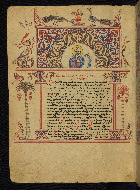
- Title: Eusebius letter with author portrait
- Form: Framed text page
- Text: Letter of Eusebius to Carpianus
fol. 4r:
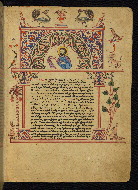
- Title: Eusebius letter with portrait of Carpianus
- Form: Framed text page
- Text: Letter of Eusebius to Carpianus
fol. 4v:
fol. 5r:
fol. 5v:
fol. 6r:
fol. 6v:
fol. 7r:
fol. 7v:
fol. 8r:
fol. 10v:
fol. 47r:
fol. 48r:
fol. 49r:
fol. 50r:
fol. 55r:
fol. 64v:
fol. 67v:
fol. 68r:
fol. 70v:
fol. 95r:
fol. 96r:
fol. 97r:
fol. 100v:
fol. 107v:
fol. 108r:
fol. 109v:
fol. 110v:
fol. 112v:
fol. 114v:
fol. 115v:
fol. 117v:
fol. 118v:
fol. 146v:
fol. 164r:
fol. 166r:
fol. 169v:
fol. 175r:
fol. 178v:
fol. 182v:
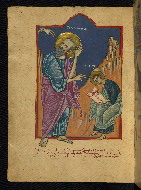
- Title: Portrait of the Evangelist John and Prochoros
- Form: Full-page miniature
- Text: Opening of John's Gospel
fol. 186r:
fol. 205v:
fol. 208r:
fol. 209r:
fol. 210r:
fol. 213v:
fol. 227v:
fol. 229v:
fol. 231r:
The binding is original.
Blind-tooled with stepped cross on front cover and rectangle on back; holes on both boards from from missing metal cross and corner pieces; inner boards lined with red silk
Illuminated by Hovannes, son of Chanipek and Et'ar, and copied by his pupil Melk'on, in early seventeenth century for woman named Napat' as memorial for herself, her parents Sargis and Telshat, and her deceased sons Melk'on, Khatchatur, and Gharip; Napat' gave it to the Church of St. Sargis in Amida; see colophon (fols. 236v-239v) for provenance, as well as artist's signature under image of John and Prochoros (fol. 182v)
Acquired by Henry Walters, before 1931
Walters Art Museum, 1931, by Henry Walters bequest
Mathews, Thomas F. and Roger S. Wieck, eds. Treasures in Heaven: Armenian Illuminated Manuscripts. New York: Pierpont Morgan Library, 1994, pp. 151-152, no. 10, figs. 72 (fol. 183r), 98 (182v).
Sanjian, Avedis K. A Catalogue of Medieval Armenian Manuscripts in the United States. Berkeley: University of California Press, 1976, pp. 310-318.
Thanks are expressed to Professor Bernard Coulie (Université catholique de Louvain, Louvain-la-Neuve) for kindly making available his bibliography on the Armenian manuscripts kept in the Walters Art Museum.
De Ricci, Seymour. Census of Medieval and Renaissance Manuscripts in the United States and Canada. Vol. 1. New York: H. W. Wilson Company, 1935, p. 761, no. 26.
Der Nersessian, Sirarpie. Armenian Manuscripts in the Walters Art Gallery. Baltimore: Walters Art Gallery, 1973, pp. 56-62, no. VII, pls. 174-199.
Principal catalogers: Der Nersessian, Sirarpie; Landau, Amy; van Lint, Theo M
Catalogers: Herbert, Lynley; Noel, William
Editor: Herbert, Lynley
Copy editor: Dibble, Charles
Conservators: Owen, Linda; Quandt, Abigail
Contributors: Emery, Doug; Noel, William; Pizzinato, Riccardo; Tabritha, Ariel; Toth, Michael B.; Wiegand, Kimber
The Walters Art Museum
Licensed for use under Creative Commons Attribution-NonCommercial-ShareAlike 3.0 Unported Access Rights, http://creativecommons.org/licenses/by-nc-sa/3.0/legalcode. It is requested that copies of any published articles based on the information in this data set be sent to the curator of manuscripts, The Walters Art Museum, 600 North Charles Street, Baltimore MD 21201.
